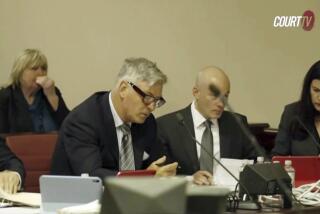Jury Selection Launches New Broderick Trial : Courts: Candidates for jury are questioned about their own violent tendencies in preparation for La Jolla socialite’s double-murder retrial.
- Share via
Jury selection officially began Friday in La Jolla socialite Elisabeth Anne (Betty) Broderick’s double-murder retrial, as about 120 jurors were asked to reveal in three lines or less whether they had ever been so angry at someone that they thought about killing them.
A 35-page, 150-question form--a virtual copy of the one used to kick off the first trial in the case last year--also presented questions about other topics central to the case, such as whether jurors object to vulgar language, believe the legal system is fair and have strong feelings about guns.
The distribution of the lengthy form, which has become a common practice in complex cases, marked the official start of what San Diego Superior Court Judge Thomas J. Whelan said was likely to be a nine-week trial. Over the next few weeks, jurors will undergo individual questioning before 12 jurors are picked and the two sides of the case are presented.
Broderick, 43, is charged with two counts of murder in the Nov. 5, 1989, shooting deaths of her ex-husband, Daniel T. Broderick III, 44, and his new wife, Linda Kolkena Broderick, 28.
Daniel Broderick was a prominent medical malpractice attorney and a former president of the San Diego County Bar Assn. Linda Broderick was his office assistant.
Betty Broderick’s first trial ended last November in a hung jury. She has remained at the Las Colinas Jail in Santee since she surrendered to authorities the day of the killings.
The killings came after a long and bitter divorce, and the case has attracted wide interest. Aside from stories in the San Diego and national press, the case has been featured in several magazines and on tabloid television shows. Books as well as television and movie scripts are in the works.
Interest is so intense that even what Betty Broderick wears to court gets noticed. On Friday, she showed off a blue flower-print dress, an outfit that she had not worn in last year’s trial.
The jury pool was screened Friday for people with financial hardships, medical disabilities or paid-for vacations. It was not screened for lawyers, so--at least until individual questioning begins Oct. 7--a deputy county public defender, Alex Loebig Jr., remains in the pool.
Of the 150 questions that jurors were asked Friday in the forms, 10 dealt with divorce. One asked, “Do you feel there is a need for any changes in the way divorces are presently handled by the legal system?”
Betty Broderick contends that Daniel Broderick manipulated the system to his benefit in their divorce.
The questionnaire does not indicate which side wrote which question. It is not clear, for instance, whether Deputy Dist. Atty. Kerry Wells or defense attorney Jack Earley asked the questions about abortion.
After her first two children were born and before she bore two others, Betty Broderick had an abortion. The questionnaire asks jurors, “Do you have strong feelings about abortion?”
It also asks three questions about vulgar language, including, “Do you feel different about a woman’s use of vulgar language than a man’s?” At the first trial, prosecutor Wells played several dozen obscene and vulgar messages that Betty Broderick left on Daniel and Linda Broderick’s answering machine.
The questionnaire asks 12 questions about mental health care, including, “What is your opinion, if any, about the usefulness of testimony by psychiatrists or psychologists in criminal trials?” The first trial featured extensive testimony on Betty Broderick’s personality from experts for both the prosecution and defense.
The form also asks jurors to rank, on a scale, the honesty level of the following: state legislators, criminal defense attorneys, prosecutors, police departments, police officers, newspaper reporters, civil lawyers and judges.
The answered forms will be made public as each juror is called for questioning. Whelan stressed that jurors had the option of asking him to keep confidential those answers to sensitive questions.
More to Read
Sign up for Essential California
The most important California stories and recommendations in your inbox every morning.
You may occasionally receive promotional content from the Los Angeles Times.













